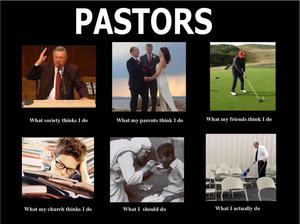 Earlier this week I recorded a podcast episode talking about younger ministry leaders being involved in doing staff evaluations. One of the things I commented on was making sure to use an objective standard for doing those evaluations, the job description. But that opens up a whole other discussion of job descriptions in ministry settings. My suspicion is that many of us are serving in churches and ministries without adequate job descriptions to lay out what is expected. I don't mean this as a knock, churches call faithful pastors & ministry leaders and most of those who are called are faithfully laboring, working 50+ hours a week, and giving their all to their calling. That said, it's crucial to ensure that we have good job descriptions. And in the podcast episode I argued for fluid job descriptions. Much of this comes from Jim Collins' "who then what" philosophy on hiring, that you get the right people on board first and fill the position second. I think there's a lot of carryover to ministry from that mindset. When we bring a leader on board, we're not just filling a role, we're bringing in a person first. We're bringing in a unique gift set, a unique calling, a unique perspective, and a unique expectation. My argument is for job descriptions to be fluid because of three major shifts in ministry life: Circumstances - Maybe the position moved from part-time to full-time or from a dedicated role to a "Slashy" role where responsibilities are combined. No church is able to maintain for its lifespan its current staffing structure. It's just not possible. Ministries grow or shrink, financial health changes, leadership philosophy changes. If a church has experienced significant growth in a particular ministry area to the point that a part-time leader cannot handle the load, it is both foolish and abusive to levy expectations in an outdated job description. Person - You are not your predecessor. And you are not your successor. You are you. Whatever job description you've been given, it likely wasn't written with you in mind. What I'm not arguing for is for a leader to write their own job description, that can be a recipe for disaster. I watched a church do that once and had a key staff member revise his description so much that he had no responsibility and no lines of accountability to deal with those issues. But your job description needs to reflect who you are, your giftedness, your calling, and your abilities. And we as senior leaders in churches and ministries should be willing to adjust our staffing parameters and model based on who God has sent us. Culture - The way we do ministry now is much different than it was in the 1990s or even the 2000s. It's shifted greatly from program-oriented ministry to person/discipleship oriented approach. But in many cases our job descriptions don't reflect that shift. I was handed one in a previous stop that required me to be responsible for a youth choir. Sounds nice but 1) Those were largely a product of the 90s and weren't as common, and 2) I'm completely tone deaf. As the way we do ministry changes, we need to be fluid in our job descriptions to reflect that.  I want to give you 5 suggestions for how to audit your ministry job descriptions: 1. Annual Review - Hopefully your ministry is doing annual staff reviews. Use the job description as the evaluative basis for that, but be willing to ask questions like "Is this job description accurate for what you feel you need to do to be most effective?" or "Are there things we need to consider adding or taking out of this?" 2. Zero on New Hires - Whenever you bring in a new hire, as much as possible start with a Zero Description. Obviously you'll have some general parameters and expectations, but as much as you can start with a blank slate. That way you're seeking to best use a candidate's giftedness when they come on board your team, and will be able to contribute in ways you may not have initially expected. 3. Make Amending Them Easier - If it requires an act of Congress to change your job descriptions, you've made them too complicated to amend. Whatever policy and procedure adjustments you need to do in order to make amending your job descriptions easier, do them. Ours were attached to our Constitution & Bylaws, which required significant time and effort to amend (as they should). But as part of our work of reconstituting and rewriting our bylaws, we intentionally left out job descriptions. Instead, we build a Personnel Manual which can be amended by our Church Council (Leadership Team). 4. Think Person > Position - Whenever we emphasize the position over the person, I believe we turn ministry service into just a job, just a role. Instead, we need to remember that when we have someone on board our ministry team, we're bringing them on just that: our team. So we need to consider someone serving on our team as the goal, not filling a position necessarily. Again, not saying we abandon positions, but we do need to make sure that the person is more than the role. And if you're serving in a senior leadership role and you have a key staff member you want to keep who may not be in the best role, explore the possibility of a role adjustment. A good team is worth hanging on to, more than making sure the roles are filled. *For more on teams and developing a healthy ministry, check out my book Dream Teams 5. Like, Don't Love Them - At the end, it's important that we like our job descriptions but avoid falling in love with them. Things we're in love with are difficult to change because of the emotional attachment to them. Job descriptions are a tool. Use them like one. And don't fall too much in love with a tool, because eventually it will need to be replaced. And an unhealthy attachment to something intended to be used is going to lead to misplaced priorities. What does your church do with job descriptions?
1 Comment
|
Scott M. DouglasA blog about leadership and the lasting legacy of family ministry. Archives
August 2023
Categories
All
|
 RSS Feed
RSS Feed



